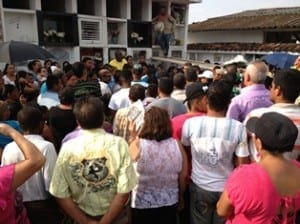
Family and friends attend the funeral of slain trade unionist, Juan Carlos Pérez Muñoz. Credit: Robinson Cook
Juan Carlos Pérez Muñoz, a trade union member in Colombia, was gunned down last week on his way to board a bus to the Cauca River Valley where he worked in the sugarcane fields.
The death of Pérez, 30, a leader in the SINTRAINAGRO union’s struggle for living wages and decent working conditions at the La Cabaña sugar plantation, came just days after two rallies by sugarcane workers. The workers were protesting the firing of 87 employees of the La Cabaña and 24 employees Maria Luisa plantations. Since December, when the sugarcane workers collectively began pushing for workplace improvements through SINTRAINAGRO, workers have been subjected to threatening phone calls and other forms of harassment, and the company has refused to negotiate.
“Anti-union violence and the victimization of the workers is still growing,” the union federation CUT (Central Unitaria de Trabajadores de Colombia), said in a statement. In Colombia, “the rights of workers continue to be violated,” CUT Human Rights Director Alberto Vanegas Zuluaga, told Colombia Reports.
Sugarcane development is a thriving business in Valle del Cauca. Nearly half its cultivated area is devoted to sugarcane production as either raw sugar or ethanol, about one-third of it for export. Sugarcane cutters work as long as 14 hours per day and make as little as $200 a month. Because they are largely subcontracted, they receive no health care or pensions and must provide their own safety equipment—and have no recourse if they are injured on the job.
Colombia remains the deadliest country for union leaders and members. In 2012, 19 trade unionists were murdered and there were at least 10 attempted murders, according to the Colombian non-governmental organization, Escuela Nacional Sindical. The International TradeUnion Confederation (ITUC) says that although some efforts have been made to investigate these crimes, the majority of the cases reported by trade union organizations remain unsolved.
In recent meetings with the Minister of Labor and the Minister of the Interior, SINTRAINAGRO and CUT denounced the violence and threats to leaders and members of the sugarcane workers’ union and to SINTRAINAGRO’s national leadership and asked the governmentto provide protection. They made clear that without government protection, more unionists would be killed. Perez was gunned down a few days later, leaving behind his wife, Luz Aidé, and son.
